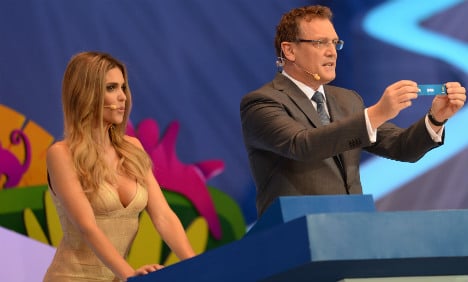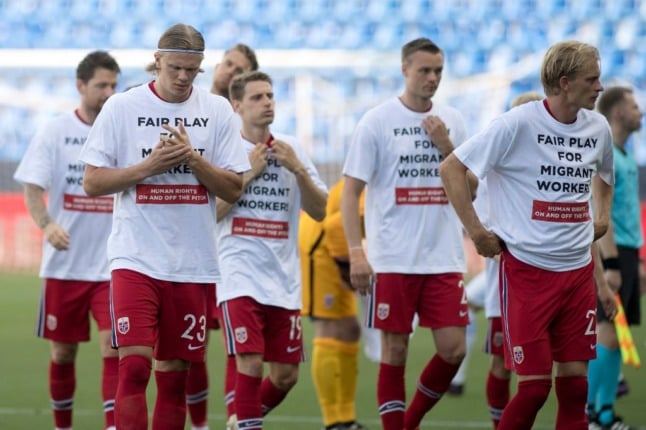The mouth-watering start for the Spanish was just one twist in the draw at Costa do Sauipe, a northeastern beach resort, as England must meet Italy when the pair brave the heat of Manaus — just what England manager Roy Hodgson did not want.
FIFA, confident Brazil will overcome stadium delays which will see the opening match venue Sao Paulo completed only in mid-April, will Sunday open the next stage of ticket sales — all tickets for the opening match and the July 13th final have already been snapped up.
And FIFA president Sepp Blatter and Brazilian officials, who have not always seen eye to eye on preparations that the game's world body has judged as laggardly, both used the draw to tell the world the event will be the best ever — "this will be the Cup of Cups" as Brazil President Dilma Rousseff put it.
England have a tough task on paper, drawn in a group containing three former champions — themselves, four-time winners Italy and twice winners Uruguay — as well as Costa Rica.
Football Association chairman Greg Dyke's reaction summed up the sombre mood in the England camp when he was caught on camera drawing a finger across his throat in a 'we're dead' gesture.
But Spain, who won their first title in South Africa four years ago, also have a difficult Group B as after they play the three-time runners-up Dutch on June 13th in Salvador they then take on talented Chile in Rio before facing Australia in Curitiba.
"I said to people this morning we were going to get Holland and we did, in the first game no less," said Spain coach Vicente Del Bosque.
"Holland will demand that we start at our highest level."
Brazil, bidding for a sixth title but a first at home after losing the 1950 final match to Uruguay, take on Croatia in Sao Paulo on June 12 — assuming the venue is ready after a fatal accident last week delayed prospective completion for another four months.
The Brazilians will then take on Mexico and Cameroon in a Group A that appears on the face of it unthreatening, if not easy.
"We must pay close attention to the opening phase," said Brazil's 2002 title-winning coach Luiz Felipe Scolari.
"We must play every game as if it were the final right from the outset."
England, meanwhile, will start off with a Group D meeting against four-time champions Italy in the heat of Amazonian venue Manaus on June 14 — though it is at least an evening kick-off.
That match is a repeat of the Euro 2012 quarter-final, which Italy, who knocked England out of the 1978 World Cup qualifiers, won on penalties.
"It's a tough group, there's no doubt about that," said Hodgson, whose team also face Uruguay, a third former champion in their group, and Costa Rica.
"In Italy and Uruguay it's almost as though we have got two number one seeds in our group."
Italian opposite number Cesare Prandelli described it as "the Group of Death".
"We are worried about the distances we shall have to cover. The game against England will be very important," he added.
After the Italians, Hodgson's side then take on Uruguay in Sao Paulo on June 19th and Costa Rica in Belo Horizonte on June 24th.
A notable subplot will see Germany go up against the United States, now coached by former Germany coach Jurgen Klinsmann in Recife on June 26th in their final pool match.
"That's one of those crazy stories that football writes," Klinsmann told German broadcaster ARD.
Germany, whose third and last title came in 1990, also drew Ghana and Portugal in Group G.
Klinsmann coached Germany to third at the 2006 World Cup with current German boss Joachim Loew his then assistant.
Argentina, champions in 1978 and 1986, meet sole newcomers Bosnia in Rio on June 15th and then will face Iran and Nigeria.
Former England boss Fabio Capello was happy after he saw his Russian charges draw seeded Belgium, South Korea and Algeria in Group H.
"I'm pleased with the draw. Some of the other groups consist of much stronger teams," said Capello, a second-round loser with England in 2010.
France, champions in 1998 but forced to come through the playoffs, were thrilled with what they perceived as their manageable draw against Group E seeds Switzerland as well as Ecuador and Honduras.
Japan, meanwhile, saw themselves lumped in with seeded Colombia, Ivory Coast and Greece in Group C.
After a poignant homage to the late Nelson Mandela — Brazil will now observe seven days of mourning for his loss — the draw began to the exhilarating sound of samba at the northeastern beach resort of Costa do Sauipe.
The draw build-up had been dominated by news of stadium delays and anti-World Cup campaigners threatening public protest.
Yet Mandela's death changed the tone as participants remembered how he saw in sport a means of fostering social progress.



 Please whitelist us to continue reading.
Please whitelist us to continue reading.
Member comments